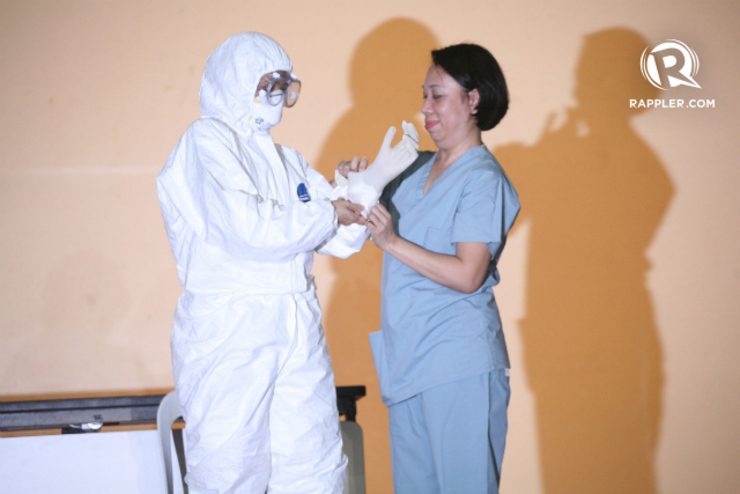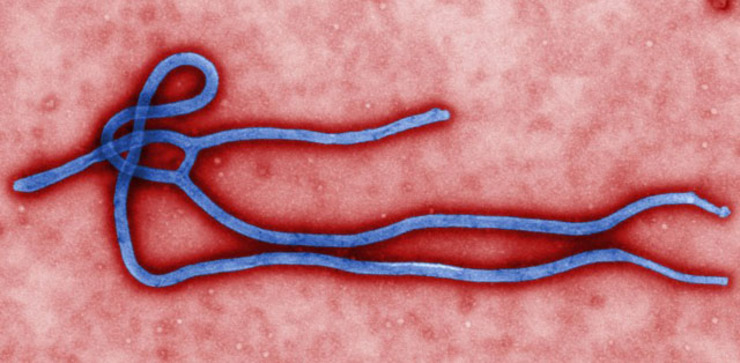SUMMARY
This is AI generated summarization, which may have errors. For context, always refer to the full article.


MANILA, Philippines – While the World Health Organization (WHO) recently declared West African countries Senegal and Nigeria free of the Ebola virus, the Philippines is not letting its guard down
Julie Hall, WHO Representative in the Philippines, said the country is systematic in reviewing its preparedness and processes for Ebola.
“Being systematic and being very meticulous is what is required for Ebola, and that’s what we’re seeing here in the Philippines,” she said in a press briefing at the Research Institute for Tropical Medicine (RITM) on Tuesday, October 21.
She said that with its meticulous attention to things – from the personal protective equipment (PPE) and training of health workers to infection control – the country’s approach is systematic in making sure all health workers are aware about Ebola.
The Ebola virus, which can be transmitted through bodily fluids, causes severe fever, muscle pain, weakness, vomiting, and diarrhea. In some cases, it also causes organ failure and unstoppable bleeding. It can kill victims in just days.
As of October 14, WHO said the 2014 Ebola outbreak has already killed 4,555 out of 9,216 cases mostly in West African countries Guinea, Liberia, and Sierra Leone. (READ: 5 misconceptions about Ebola)
RITM processes
The Philippines on October 28 will start training health workers from public and private hospitals for Ebola.
The government has also identified one referral center for every region in the country, and the RITM was designated as the National Referral Center for Emerging and Re-emerging Infectious Diseases. (READ: RITM on top of preparations for possible Ebola cases)
RITM opened its doors to media on Tuesday for a walk-through of how the hospital will handle things should an Ebola case arrive in the country.

FULL COVERAGE: EBOLA CRISIS
Vehicles will be stopped at a tent set up in front of the center to ask the patient what they will consult for. If the patient has a travel history to and from West Africa, he or she will be sent to the triage area and will be asked further questions on the severity of his or her condition.
If the patient shows symptoms of Ebola, he or she will be isolated and tested for Ebola. The turnaround time before knowing the results is from 24 to 48 hours.
RITM director Socorro Lupisan said RITM can accommodate up to 14 patients with Ebola in 7 negative pressure rooms, 2 intensive care units, and 3 wards.
But she said they will “play it by ear” if closing down the entire hospital will be necessary, similar to what they did during the H1N1 pandemic in 2009.
Health Secretary Enrique Ona on Tuesday said his department is already ordering more PPEs, in addition to 2000 PPEs it already has in stock. The budget will come from DOH’s disaster budget of P500 million ($11.17 million)*.
He said the country is upgrading its efforts to prevent the entry of Ebola. The preparations come as the government is set to raise alert level 3 – voluntary repatriation – over Ebola-affected West African countries “effective mid-November 2014.”
Filipino United Nations peacekeepers from Liberia are also scheduled to arrive on November 10. (READ: PH not sending health workers to Ebola zone) – Rappler.com
(Editor’s note: We earlier reported that DOH’s disaster budget is P500 billion. The correct figure is P500 million. We regret the error.)
*1 US$ : P44.77
Add a comment
How does this make you feel?
There are no comments yet. Add your comment to start the conversation.